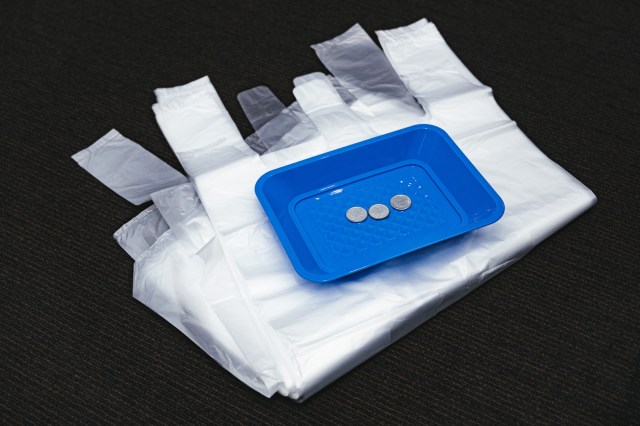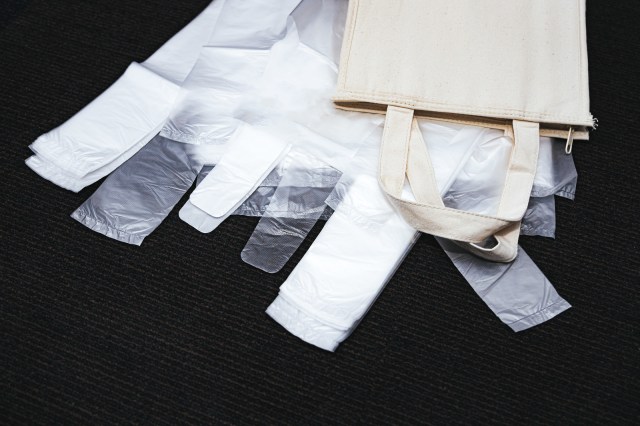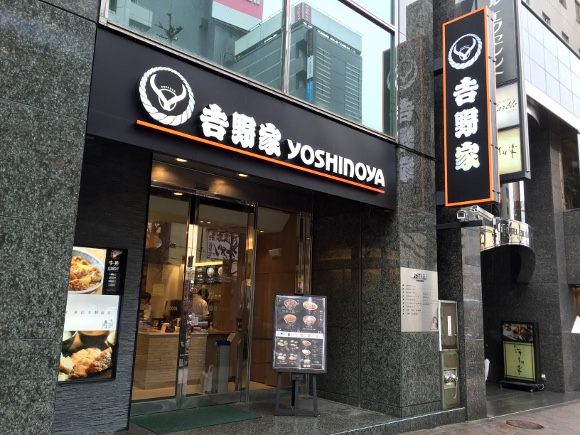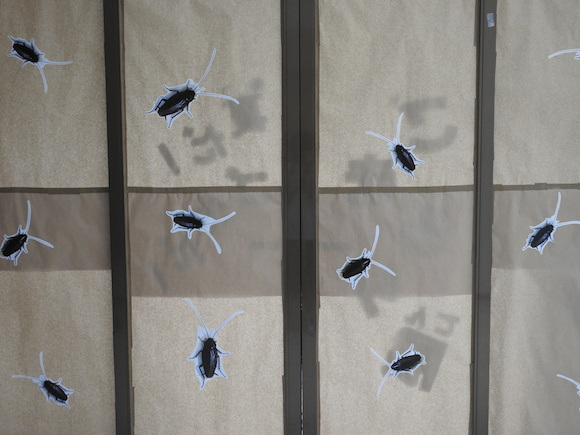
No good deed goes uncircumvented.
On 1 July, the Japanese government enacted a ban on the practice of handing out free plastic bags by retail businesses. Instead, shops, convenience stores, and restaurants must charge extra for such a luxury. This is of course an effort to reduce plastic waste and encourage people to embrace the reusable-bag lifestyle instead.
▼ Some chains like Yoshinoya have avoided change by using a more biodegradable material in their bags
The good news is that it seemed to have had an immediate effect. Although some bemoaned the added wait times at the register and limitations on how much people can carry/buy, there certainly has been a significant reduction in customers using plastic bags within the first month alone. It seems that charging 3 to 5 yen (US$0.03 – $0.05) per bag was just too rich for a lot of people’s blood.
At the three biggest convenience store chains, where bags were once given out more rapidly than anywhere else, plastic bag refusal rates have swelled to over three-quarters across the board. This is considerably higher than the 25 percent seen before the law came into effect.
The bad news is that on the household goods site Lohaco, orders for plastic shopping bags spiked last month, amounting to about a 300-percent increase for the same time last year. This would mean that rather than giving up plastic bags cold turkey, some people simply went in search of a better deal than 3 yen per bag.
▼ Does it count if we keep all our plastic bags in a reusable cloth bag?

The overwhelming reason to continue craving plastic bags is as a way to hold household garbage. Those smaller sized convenience store bags were especially convenient when it came to containing moister and smellier leftover waste products from dinner like vegetables trimmings and the inedible parts of fish.
Meanwhile, the larger bags gotten from supermarkets tended to be a useful size to hold the amount of overall garbage that accumulates in between garbage pickup, which occurs several times a week in Japan, often with different types of garbage getting picked up on different days. With many urban Japanese homes dealing with limited space, frequent bagging has been an important defense at keeping the sights and smells of daily waste at bay.
Without any alternatives, many people were at a loss with what to do with their garbage and weren’t quite ready to part with plastic bags just yet. This might sound petty, but in their defense, this is peak cockroach season and keeping certain kinds of garbage contained is an important line of defense against those big bastards.
▼ You know your government’s out of touch when problems like smelly garbage and roaches never cross their minds
This result has lead many to point the finger at the government for both inconveniencing their lives and failing to save the environment.
“It’s a meaningless policy that doesn’t help to reduce waste.”
“Yup, I’m one of those people. I bought some bags at the 100 yen shop.”
“This is all stupid.”
“Those bags are essential for garbage.”
“I just bought 100 bags. That policy didn’t amount to much.”
“I have no other choice.”
“So the people using eco-bags are also buying plastic bags in bulk…”
It’s certainly not an ideal situation at the moment, but it’s important to remember that we’re still in the knee-jerk reaction stage of all this. I can remember back when Japan raised the price of a pack of cigarettes to 440 yen ($4.12) and people I knew were starting to buy cans of tobacco to roll their own or even smoking piles of dead leaves to try and compensate.
But as time passed everyone gave in to the prevailing trends either by accepting the new price, smoking less, or quitting smoking altogether. Something like this will probably happen with bags too as people find their own ways to adapt, and at least there are some promising signs that were on the right track with it.
If anything, this all should be a wake-up call to any material producers out there that a very real and very huge demand for eco-friendly trash receptacles has suddenly sprung up.
Source: NHK News Web, Hachima Kiko
Top image: Pakutaso
Insert images: © SoraNews24 (Unless otherwise noted)
● Want to hear about SoraNews24’s latest articles as soon as they’re published? Follow us on Facebook and Twitter!



 Ban on free plastic forks and spoons drafted by Japan’s Ministry of Environment
Ban on free plastic forks and spoons drafted by Japan’s Ministry of Environment Japan considering adding charges for plastic convenience store utensils, hotel hangers, and more
Japan considering adding charges for plastic convenience store utensils, hotel hangers, and more Family Mart convenience stores will stop offering plastic forks, recommends chopsticks instead
Family Mart convenience stores will stop offering plastic forks, recommends chopsticks instead No more plastic cups — Starbucks Japan aims to get rid of plastic in stores with new initiatives
No more plastic cups — Starbucks Japan aims to get rid of plastic in stores with new initiatives Uniqlo and GU announce they will now charge for shopping bags in a new, eco-friendly initiative
Uniqlo and GU announce they will now charge for shopping bags in a new, eco-friendly initiative Ramen for 99 yen?!? Best value-for-money noodles found at unlikely chain in Japan
Ramen for 99 yen?!? Best value-for-money noodles found at unlikely chain in Japan Viral Japanese cheesecake from Osaka has a lesser known rival called Aunt Wanda
Viral Japanese cheesecake from Osaka has a lesser known rival called Aunt Wanda Lawson adds doughnuts to its convenience store sweets range, but are they good enough to go viral?
Lawson adds doughnuts to its convenience store sweets range, but are they good enough to go viral? Can we be just like Shohei Ohtani on a budget with a Hello Kitty cap?
Can we be just like Shohei Ohtani on a budget with a Hello Kitty cap? Chance to play Teris on a massive staircase in Kyoto Station coming in March
Chance to play Teris on a massive staircase in Kyoto Station coming in March Foreign tourists in Japan will get free Shinkansen tickets to promote regional tourism
Foreign tourists in Japan will get free Shinkansen tickets to promote regional tourism The best Hobonichi diaries, covers and stationery for 2026
The best Hobonichi diaries, covers and stationery for 2026 What is Teru Teru Bozu? The tragic history behind the Japanese fine weather doll
What is Teru Teru Bozu? The tragic history behind the Japanese fine weather doll Potama serves up epic rice balls like no other, and there’s only one store in Tokyo
Potama serves up epic rice balls like no other, and there’s only one store in Tokyo Death Spray from Japan causes buzz online for powerful ability to cut ties with bad energy
Death Spray from Japan causes buzz online for powerful ability to cut ties with bad energy Starbucks Japan releases first-ever Hinamatsuri Girls’ Day Frappuccino
Starbucks Japan releases first-ever Hinamatsuri Girls’ Day Frappuccino Japanese restaurant chain serves Dragon Ball donuts and Senzu Beans this spring
Japanese restaurant chain serves Dragon Ball donuts and Senzu Beans this spring Highest Starbucks in Japan set to open this spring in the Tokyo sky
Highest Starbucks in Japan set to open this spring in the Tokyo sky Japan Extreme Budget Travel! A trip from Tokyo to Izumo for just 30,000 yen [Part 1]
Japan Extreme Budget Travel! A trip from Tokyo to Izumo for just 30,000 yen [Part 1] Japan has only one airport named after a samurai, so let’s check out Kochi Ryoma【Photos】
Japan has only one airport named after a samurai, so let’s check out Kochi Ryoma【Photos】 Japan Extreme Budget Travel! A trip from Tokyo to Izumo for just 30,000 yen [Part 2]
Japan Extreme Budget Travel! A trip from Tokyo to Izumo for just 30,000 yen [Part 2] Japan’s craziest burger chain takes menchi katsu to new extreme levels
Japan’s craziest burger chain takes menchi katsu to new extreme levels Japanese drugstore sells onigiri at pre-stupid era prices, but how do they compare to 7-Eleven?
Japanese drugstore sells onigiri at pre-stupid era prices, but how do they compare to 7-Eleven? Yakuzen ramen restaurant in Tokyo is very different to a yakuza ramen restaurant
Yakuzen ramen restaurant in Tokyo is very different to a yakuza ramen restaurant Tokyo Skytree turns pink for the cherry blossom season
Tokyo Skytree turns pink for the cherry blossom season Japan’s newest Shinkansen has no seats…or passengers [Video]
Japan’s newest Shinkansen has no seats…or passengers [Video] Starbucks Japan releases new sakura goods and drinkware for cherry blossom season 2026
Starbucks Japan releases new sakura goods and drinkware for cherry blossom season 2026 Foreigners accounting for over 80 percent of off-course skiers needing rescue in Japan’s Hokkaido
Foreigners accounting for over 80 percent of off-course skiers needing rescue in Japan’s Hokkaido Super-salty pizza sends six kids to the hospital in Japan, linguistics blamed
Super-salty pizza sends six kids to the hospital in Japan, linguistics blamed Starbucks Japan unveils new sakura Frappuccino for cherry blossom season 2026
Starbucks Japan unveils new sakura Frappuccino for cherry blossom season 2026 The 10 most annoying things foreign tourists do on Japanese trains, according to locals
The 10 most annoying things foreign tourists do on Japanese trains, according to locals Take a trip to Japan’s Dododo Land, the most irritating place on Earth
Take a trip to Japan’s Dododo Land, the most irritating place on Earth Naruto and Converse team up for new line of shinobi sneakers[Photos]
Naruto and Converse team up for new line of shinobi sneakers[Photos] Is China’s don’t-go-to-Japan warning affecting the lines at a popular Tokyo gyukatsu restaurant?
Is China’s don’t-go-to-Japan warning affecting the lines at a popular Tokyo gyukatsu restaurant? Survey asks foreign tourists what bothered them in Japan, more than half gave same answer
Survey asks foreign tourists what bothered them in Japan, more than half gave same answer Japan’s human washing machines will go on sale to general public, demos to be held in Tokyo
Japan’s human washing machines will go on sale to general public, demos to be held in Tokyo Starbucks Japan releases new drinkware and goods for Valentine’s Day
Starbucks Japan releases new drinkware and goods for Valentine’s Day We deeply regret going into this tunnel on our walk in the mountains of Japan
We deeply regret going into this tunnel on our walk in the mountains of Japan Studio Ghibli releases Kodama forest spirits from Princess Mononoke to light up your home
Studio Ghibli releases Kodama forest spirits from Princess Mononoke to light up your home Major Japanese hotel chain says reservations via overseas booking sites may not be valid
Major Japanese hotel chain says reservations via overseas booking sites may not be valid Put sesame oil in your coffee? Japanese maker says it’s the best way to start your day【Taste test】
Put sesame oil in your coffee? Japanese maker says it’s the best way to start your day【Taste test】 No more using real katana for tourism activities, Japan’s National Police Agency says
No more using real katana for tourism activities, Japan’s National Police Agency says A tale on the etiquette of using Japan’s plastic umbrella covers
A tale on the etiquette of using Japan’s plastic umbrella covers Japanese company tackles plastic consumption by making tote bags out of discarded umbrellas
Japanese company tackles plastic consumption by making tote bags out of discarded umbrellas Pokémon saving the planet with free Poké Ball-case eco bags from 7-Eleven Japan
Pokémon saving the planet with free Poké Ball-case eco bags from 7-Eleven Japan Japanese convenience store will now ask customers who ask for a fork to use chopsticks instead
Japanese convenience store will now ask customers who ask for a fork to use chopsticks instead Japanese city changes “burnable trash” bags to “the only option is to burn this trash” bags
Japanese city changes “burnable trash” bags to “the only option is to burn this trash” bags Tokyo Metropolitan Police shows us how to make garbage bags out of newspaper
Tokyo Metropolitan Police shows us how to make garbage bags out of newspaper Shopping at Japanese convenience store Lawson? Don’t forget to take a cooking pot with you!
Shopping at Japanese convenience store Lawson? Don’t forget to take a cooking pot with you! Taiwanese Netizen makes good on promise, rides motorcycle wearing nothing but plastic bag 【Video】
Taiwanese Netizen makes good on promise, rides motorcycle wearing nothing but plastic bag 【Video】 Japanese KitKats swap plastic bags for paper packaging with new origami feature
Japanese KitKats swap plastic bags for paper packaging with new origami feature What do you think of Muji’s new sustainable cutlery cover?
What do you think of Muji’s new sustainable cutlery cover? Hokkaido police station evacuated after elderly man brings bombshell in a plastic bag
Hokkaido police station evacuated after elderly man brings bombshell in a plastic bag These little-known Japanese plastic bags can be a lifesaver in times of disaster
These little-known Japanese plastic bags can be a lifesaver in times of disaster Japanese government doggie bag initiative asking restaurant to let customers take leftovers home
Japanese government doggie bag initiative asking restaurant to let customers take leftovers home “Recycling in Japan” or “Reasons to get it right and avoid eternal shame”
“Recycling in Japan” or “Reasons to get it right and avoid eternal shame” Foreign tourist arrested in Japan for striking convenience store clerk over 3-yen bag altercation
Foreign tourist arrested in Japan for striking convenience store clerk over 3-yen bag altercation